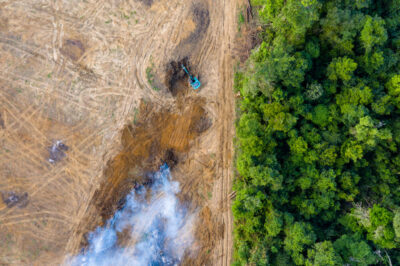Main content
The urgency of understanding Planetary Health has been established firmly over the past years. Many publications in medical and academic papers as well as declarations and conventions of international organizations such as the United Nations and the World Medical Association (WMA) underline this urgency.
Synergy of concepts
The concepts of Planetary Health and the Right to Health are closely linked. Both concepts are deeply rooted in International Human Rights Law and International Codes of Conduct of Health Professionals.
The International Federation of Health and Human Rights Organizations (IFHHRO) has always focused on the question what role individual and organised health professionals can – or rather should – play in the defence and promotion of the Right to Health.
Why this focus? Because health professionals are often the first (and at times the only ones) who witness violations of the Right to Health and other human rights violations.
It is IFHHRO’s conviction that health professionals – individually and organised – should be empowered and facilitated in their efforts to defend and implement the Right to Health and Planetary Health, and that they should be included in the global struggle for the Right to Health and Planetary Health.
Planetary health
In 2015, the Rockefeller Foundation – Lancet Commission on planetary health published the report Safeguarding human health in the Anthropocene epoch, which can be summarised as follows.
‘Far-reaching changes to the structure and function of the Earth’s natural systems represent a growing threat to human health. As a Commission, we are deeply concerned that the explanation is so straightforward and sobering: we have been mortgaging the health of future generations to realise economic and development gains in the present. By unsustainably exploiting nature’s resources, human civilization has flourished but now risks substantial health effects from the degradation of nature’s life support systems in the future. Health effects from changes to the environment, including climate change, ocean acidification, land degradation, water scarcity, overexploitation of fisheries, and biodiversity loss, pose serious challenges to the global health gains of the past several decades and are likely to become increasingly dominant during the second half of this century and beyond. These striking trends are driven by highly inequitable, inefficient, and unsustainable patterns of resource consumption and technological development, together with population growth.’ [1]
The report identifies ‘three categories of challenges that have to be addressed to maintain and enhance human health in the face of increasingly harmful environmental trends. First, conceptual and empathy failures such as an over-reliance on gross domestic product as a measure of human progress and the failure to account for future health and environmental harms in comparison to present-day gains. Second, knowledge failures such as the failure to address social and environmental drivers of ill health and a historical scarcity of transdisciplinary research and funding. Third, implementation failures such as how governments and institutions delay recognition of and responses to threats, especially when faced with uncertainties.’ The report asserts that ‘Planetary health offers an unprecedented opportunity for advocacy of global and national reforms of taxes and subsidies for many sectors of the economy, including energy, agriculture, water, fisheries, and health.
Several essential steps need to be taken to transform the economy to support planetary health. These steps include:
- a reduction of waste through the creation of products that are more durable and require less energy and materials to manufacture than those often produced at present;
- the incentivisation of recycling, reuse, and repair;
- the substitution of hazardous materials with safer alternatives.’
The same year, 2015, saw the birth of The Paris Agreement, which asserts that ‘climate change is a global emergency that goes beyond national borders. It is an issue that requires international cooperation and coordinated solutions at all levels. The Agreement sets long-term goals to guide all nations:
- substantially reduce global greenhouse gas emissions to limit the global temperature increase in this century to 2 degrees Celsius while pursuing efforts to limit the increase even further to 1.5 degrees;
- review countries’ commitments every five years;
- provide financing to developing countries to mitigate climate change, strengthen resilience and enhance abilities to adapt to climate impacts.
The Agreement is a legally binding international treaty. [2]
As the world’s largest health profession organisation, the WMA claims that ‘there is now persuasive evidence demonstrating the numerous health risks posed by climate change, which threatens populations of both low- and high-income countries. These health effects include more frequent heatwaves, flooding and extreme weather events. Less direct impacts include worsening food security, malnutrition and population displacement. Addressing climate change is also considered to be an opportunity to improve global health in the 21st century due to the significant health co-benefits of low-carbon solutions.’ [3] Dr. Miguel R. Jorge, president of the WMA, said in 2020 that ‘health professionals are at the frontlines of this emergency, and we are seeing the immense loss of lives because of acting too late. We know now, more than ever, that healthy lives depend on a healthy planet. As we walk on the road to recovery, we cannot ignore that we need to build a system in place that will protect us from further damage. That is why it is important that governments take into consideration public health when they are discussing recovery packages. We need a comprehensive approach, a healthy and green recovery, and we need it now.’ [3]
It was not the first time that the UN voiced its concern about climate change, but in 2022 the UN adopted a resolution with a very precise agenda. This UN General Assembly Resolution A/76/L.75 ‘(1) Recognizes the right to a clean, healthy and sustainable environment as a human right; (2) Notes that the right to a clean, healthy and sustainable environment is related to other rights and existing international law; (3) Affirms that the promotion of the human right to a clean, healthy and sustainable environment requires the full implementation of the multilateral environmental agreements under the principles of international environmental law; and (4) Calls upon States, international organisations, business enterprises and other relevant stakeholders to adopt policies, to enhance international cooperation, strengthen capacity-building and continue to share good practices in order to scale up efforts to ensure a clean, healthy and sustainable environment for all who recognized “the right to a clean, healthy and sustainable environment as a human right’. [4]
The right to health
Many notions of the concept of Planetary Health are reflected in the Right to the Highest Attainable Standard of Health, shortened as the Right to Health. Referring to and expanding on Art 12 of the UN International Covenant on Economic, Social and Cultural Rights of 1966, the UN Committee on Social, Economic and Cultural Rights published General Comment 14 in 2000. This General Comment 14 has become one of the basic elements and reference points of professionals’ policies and behaviour.
General Comment 14 is not only very clear on the requirements of health care (the availability, accessibility, acceptability and quality), but also specifies the underlying conditions of health, such as:
- ‘to ensure access to the minimum essential food which is nutritionally adequate and safe;
- to ensure freedom from hunger for everyone, to ensure access to basic shelter, housing and sanitation, and an adequate supply of safe and potable water;
- to provide essential drugs, as from time to time defined under the WHO Action Program on Essential Drugs;
- to ensure equitable distribution of all health facilities, goods and services’ [5].
The General Comment also explains that there is always an accountable party (body or agent), usually a national or regional government, which carries responsibility for the execution of the Right to Health. The paragraph on participation ensures the inclusion of the ‘target’ persons or groups (patients), and their right to co-decide goals and outcomes of health programs.
The understanding that health is not exclusively related to (the quality and accessibility of) health care, but inextricably to the underlying conditions too, was and is a groundbreaking understanding for all organisations and individuals, including health professionals.
In the preparation of General Comment 14, the IFHHRO Medical Human Rights Network was one of the organisations, consulted by the Committee on Economic, Social and Cultural Rights, in a three days conference in London in 1999.
The IFHHRO has cooperated intensively with the Special Rapporteurs on the Right to Health, a function created in 2002 by the Commission of Human Rights of the United Nations. Many general and thematic reports of the subsequent Rapporteurs have highlighted different aspects of the Right to Health.
Planetary health and the individual health professional
I was personally confronted with systematic violations of the Right to Health when I worked twice as a volunteer physician in the notorious refugee camp Moria on Lesbos (Greece) in 2019. Almost all rights listed in the Right to Health were violated, both on health care and the underlying conditions of health. I wrote a limited assessment report that also noted the impotence of institutions and accountable parties taking responsibility and moving towards improvement. [6]
The concept of Planetary Health is of utmost importance to individuals and society at large, including in particular health professionals. The challenge however is how to include and mobilise the individual health professional in the defence (and promotion) of the Right to Health and Planetary Health.
The reality of health professionals is that their agenda is full, and carries priorities of daily clinical work, decisions and scientific obligations. The real question is how to put the Right to Health and Planetary Health in a relevant place on the agenda of the individual health professional.
The IFHHRO, as an organisation of and for health professionals, recognizes this problem, and has been developing programs and projects to include individual health professionals in the defence of the Right to Health and Planetary Health. The IFHHRO wants to ‘help healthcare providers who want to apply the right to health for the benefit of their patients and the communities in which they live. IFHHRO is currently developing an easy-to-use assessment tool, the Right to Health Toolkit. Most countries in the world have committed themselves to the delivery of adequate healthcare. Agreements with regard to this commitment are laid down in international laws and regulations and summarised in the so-called right to health. The right to health states among others that healthcare must be available, accessible and affordable for every person and must be of good quality. However, many health workers do not know how these principles pertain to their patients’ rights. The Right to Health Toolkit could be used by any healthcare provider to explore whether or not his or her own work situation meets the internationally agreed standards regarding the right to health on essential points’. [7]
In a next phase, the IFHHRO ‘will approach potential partners and ask them what they think about the draft tool and if they would be interested in helping us bring the toolkit to the attention of health providers worldwide. We will also conduct a field test of the tool in various healthcare institutions in the Netherlands and abroad, in combination with an effect study in collaboration with a university or scientific institution.’ [7]
Conclusion
The IFHHRO believes in the importance of the Right to Health and Planetary Health, and wishes to work and cooperate on implementing these rights.
The IFHHRO’s ambition is to include health professionals in this task, since they have a key position in recognising violations of the Right to Health. Education, networking, and providing an assessment toolkit are the main instruments in our ambition to make Planetary Health and the Right to Health a reality. The IFHHRO therefore welcomes cooperation and the exchange of ideas.
References
- https://www.thelancet.com/journals/lancet/article/PIIS0140-6736(15)60901-1/fulltext
- https://www.un.org/en/climatechange/paris-agreement
- https://www.wma.net/what-we-do/public-health/climate-change/
- https://documents-dds-ny.un.org/doc/UNDOC/LTD/N22/436/72/PDF/N2243672.pdf?OpenElement
- https://www.refworld.org/pdfid/4538838d0.pdf
- https://www.ifhhro.org/a-right-to-health-assessment-of-the-moria-refugee-camp-on-lesbos-island-greece/
- https://www.ifhhro.org/home/dignity-by-the-bedside-project/



















































